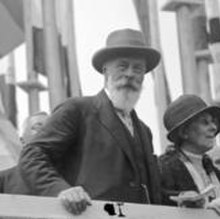Michael Hainisch
| Michael Hainisch | |
|---|---|

Michael Hainisch, July 1928, Vienna
|
|
| 2nd President of Austria | |
|
In office 9 December 1920 – 10 December 1928 |
|
| Chancellor |
Michael Mayr Johann Schober Walter Breisky Ignaz Seipel Rudolf Ramek |
| Preceded by | Karl Seitz |
| Succeeded by | Wilhelm Miklas |
| Personal details | |
| Born |
15 August 1858 Aue bei Schottwien, Austrian Empire |
| Died | 26 February 1940 (aged 81) Vienna, Nazi Germany |
| Nationality | Austrian |
| Political party | independent |
| Religion | Roman Catholicism |
Michael Arthur Josef Jakob Hainisch (German pronunciation: [ˈmɪçaːʔeːl ˈhaɪ̯nɪʃ]; 15 August 1858 – 26 February 1940) was an Austrian politician, and the second President of Austria, after the fall of the monarchy at the end of World War I.
He started out as a lawyer and an official of the Treasury and of the Education Department, but then retired to his estates in Lower Austria and Styria, where he carried on model farming, became a leader of the Austrian branch of the Fabian movement, and one of the founders of the Central People's Library. In later years he moved away from radical socialism to become a conservative agrarian.
Hainisch held aloof from political parties. He was chosen president because of his personal authority, although he was not a member of the parliament. He was an independent candidate. He was elected and assumed office in 1920, and stayed for two periods until 1928. He was married to Emilia Figdor, the descendant of a prominent Viennese assimilated Jewish family. Emilia's father, Gustav, was a town councillor of the city of Vienna.
As a president, he worked hard to improve the dire situation Austria found itself after the war. He did a lot to develop the agricultural sector, encouraged the electrification of the railway, tried to develop more tourism especially in the Alps. Trade with neighbouring countries such as Germany was encouraged. He also became a protector of local traditions and culture and initiated the creation of the law of protected monuments.
He became also an honorary member of the Akademie der Wissenschaften (Academy of Sciences).
In 1928, main parties proposed to amend the constitution in order to reelect Hainisch for a third term. Federal Chancellor Ignaz Seipel proposed a one-year term for Hainisch, but Hainisch declined a third term. He subsequently served as Commerce Minister from 1929 to 1930.
...
Wikipedia
